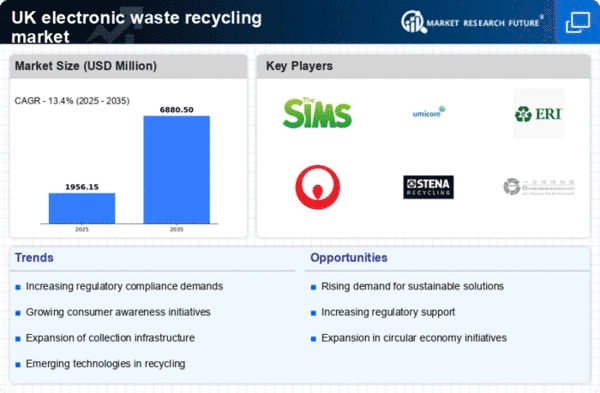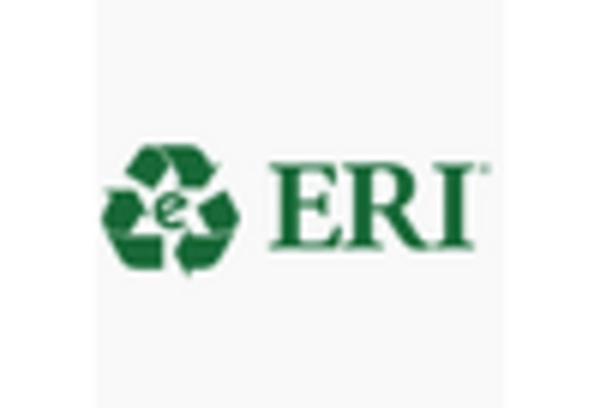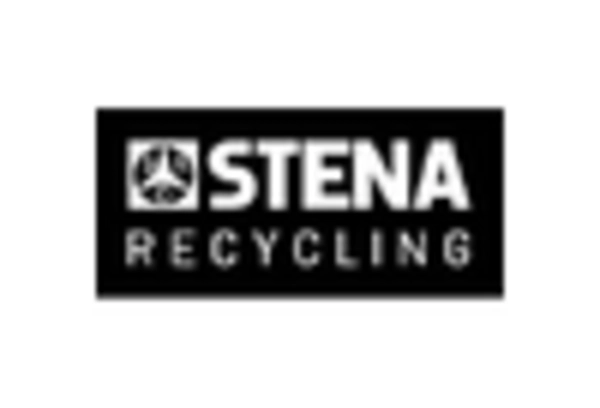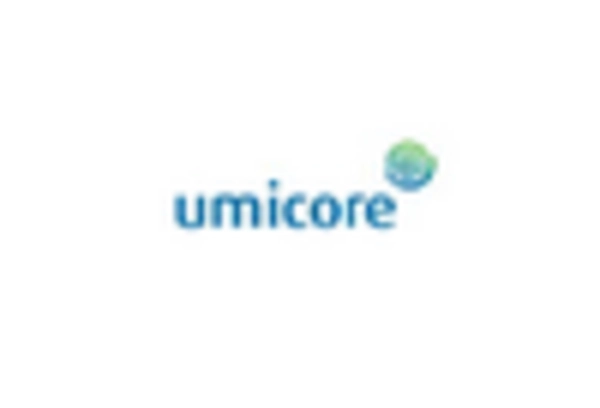Increasing Regulatory Compliance
The electronic waste-recycling market is experiencing a surge in regulatory compliance requirements in the UK. The government has implemented stringent regulations aimed at managing electronic waste effectively. For instance, the Waste Electrical and Electronic Equipment (WEEE) Directive mandates that producers are responsible for the disposal of their products. This has led to an increase in the number of registered recycling facilities, which are now required to meet specific standards. As a result, the market is likely to see a growth in demand for compliant recycling services, with an estimated increase of 15% in registered facilities over the next few years. This regulatory landscape not only promotes responsible recycling practices but also encourages innovation within the electronic waste-recycling market, as companies strive to meet these evolving standards.
Growing Awareness of E-Waste Hazards
The increasing awareness of the hazards associated with electronic waste is driving growth in the electronic waste-recycling market. Public campaigns and educational initiatives have highlighted the environmental and health risks posed by improper disposal of e-waste, such as soil and water contamination. As a result, there is a growing urgency among consumers and businesses to ensure responsible disposal of electronic products. Reports suggest that the number of e-waste collection events has risen by 25% in the past year, reflecting a heightened commitment to recycling. This awareness is likely to foster a culture of recycling within the UK, leading to increased participation in recycling programs and a potential doubling of e-waste recycling rates in the coming years.
Economic Incentives for Recycling Initiatives
Economic incentives are emerging as a significant driver for the electronic waste-recycling market. The UK government has introduced various financial incentives to encourage businesses and consumers to participate in recycling initiatives. These include tax breaks for companies that invest in sustainable practices and subsidies for recycling facilities. Such measures are designed to alleviate the financial burden associated with recycling and promote a circular economy. As a result, the electronic waste-recycling market is likely to benefit from increased investment, with projections indicating a potential growth of 18% in recycling activities over the next few years. This economic support not only enhances the viability of recycling operations but also contributes to the overall sustainability goals of the UK.
Rising Consumer Demand for Sustainable Practices
There is a notable shift in consumer behaviour towards sustainability, which is significantly impacting the electronic waste-recycling market. UK consumers are increasingly aware of the environmental implications of electronic waste and are actively seeking out recycling options. Surveys indicate that approximately 70% of consumers prefer brands that demonstrate a commitment to sustainability. This growing demand is prompting businesses to adopt more eco-friendly practices, including the implementation of take-back schemes and partnerships with recycling firms. Consequently, the electronic waste-recycling market is likely to expand as companies respond to consumer preferences, potentially leading to a 20% increase in recycling rates over the next five years. This trend not only benefits the environment but also enhances brand loyalty among consumers.
Technological Advancements in Recycling Processes
Technological advancements are playing a crucial role in shaping the electronic waste-recycling market. Innovations in recycling technologies, such as automated sorting systems and advanced material recovery techniques, are enhancing the efficiency and effectiveness of recycling operations. For instance, the introduction of AI-driven sorting technologies has the potential to increase recovery rates of valuable materials by up to 30%. These advancements not only reduce operational costs but also improve the overall sustainability of recycling processes. As technology continues to evolve, the electronic waste-recycling market is expected to transform, with companies investing in state-of-the-art equipment to stay competitive. This focus on technology could lead to a more streamlined recycling process, ultimately benefiting both the environment and the economy.
















